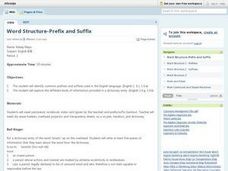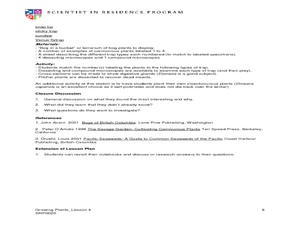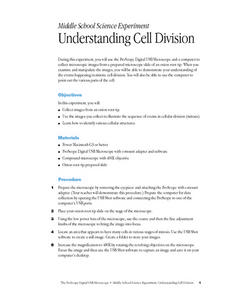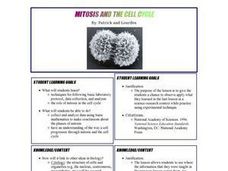Teach Engineering
Kidney Stone Crystallization
No one likes kidney stones, but they are very interesting to learn about. The last installment of a three-part unit has learners experiment with different chemicals to see which one inhibits the growth of calcium oxalate crystals (which...
National Nanotechnology Infrastructure Network
Jell-O® Waveguide and Power Loss
Jell-O® can help model the transmission of light through fiber optic cables. Young scientists use the jiggly dessert to make a waveguide to transmit a laser beam from one point to another. Their models help them learn the function...
Curated OER
Word Structure- Prefix and Suffix
Identify common prefixes and suffixes used in the English language and categorize the different kinds of information provided in a dictionary entry. Learners will write at least five pieces of information that they learn about a word...
Curated OER
It's Just Dirt
Students discover how seed germination varies according to the soil type. In this soil science instructional activity, students discuss what plants need in order to grow and investigate various types of soil. Students use their senses to...
National Nanotechnology Infrastructure Network
Lines on Paper - Laser Box
See what you cannot see by getting a little creative. An intriguing lesson has learners use lasers to explore X-ray diffraction. Given a box with unknown structures, they shine a laser through the box and interpret the results....
Texas State University
Earth: Deposition and Lithification
Geology geniuses analyze sediment samples with a hand lens and sort according to physical characteristics. They also learn about the processes of cementation, compaction, and lithification within the rock cycle. The lesson plan is...
Curated OER
Concrete
Knowing how to mix concrete is a big part of having a construction job. Here vocational learners will go through the types, economy, and uses for concrete. Each slide is rich in text but organized in an easy-to-read style. Images and...
California Academy of Science
Carbon Cycle Role Play
Anytime you make concepts clear with role playing or hands-on experience, it's a win for the whole class. Ping-Pong balls are used to represent carbon in a carbon cycle role-play activity. In small groups, children first discuss what...
Curated OER
Dilution and Concentration of Solutions
Future chemists practice laboratory techniques by creating a monochloramine solution. The objectives are to use of dilution, 9concentration, and measurement skills and to prepare a solution that will be used in a water treatment...
Teach Engineering
Challenges of Laparoscopic Surgery
Get some laparoscopic training without the pain with an activity that challenges class members to find out what it is like to perform laparoscopic surgery. Teams perform three different tasks and quantify their performance. The...
NOAA
Deep-Sea Ecosystems – Chemosynthesis for the Classroom
Photosynthesis was discovered in the 1770s, but chemosynthesis wasn't discovered until 1977. While many have performed an experiment to show how photosynthesis works, the activity allows pupils to observe chemosynthesis. Scholars set up...
Curated OER
Observation and Discovery
Students explore the basic skills guiding sound scientific invvestigation and methodology. They are introduced to a powerful scientific tool-the microscope. Students review the parts of the microscope. They discuss the inventor of the...
Curated OER
Particulate Observation
Students examine samples of common dust from their homes and school under a microscope. Students describe their samples including the location from where they were collected, and compare their samples to make hypotheses about their...
Curated OER
How Does Matter Look Up Close?
In this matter worksheet, students complete a graphic organizer by identifying tools that are used to magnify objects too small to see with just their eyes.
Curated OER
Microscopy Exercises
Students explore organisms and botany by utilizing microscopes. In this microscopic research lesson, students define many plant and organism related vocabulary terms such as conifers, moss and spores. Students view spores and other...
Curated OER
The Energy of Life in Zebrafish
Students study the stages of development of an unknown organism. In this zebrafish lesson, students examine and collect data as they use microscopes to view a zebrafish embryo.
Curated OER
Cell Types and Parts
Eighth graders, after creating a Venn Diagram comparing/contrasting animal and plant cells, writing ten similes describing cell types, or drawing a colored diagram of a cell, list cell types as well as describe and label cell parts. They...
Curated OER
Coordination
Multiple choice, fill-in-the-blank, short answer, and matching questions are all here in a multi-page worksheet or quiz. While the formatting leaves a little to be desired, it would take just a few minutes to change the handout into a...
Curated OER
Make and Use a Plankton Net
Students make simple plankton nets and use them to collect and identify common forms of plankton. They identify and interpret plankton, as seen under a microscope, whether there was more zooplankton or phytoplankton. Finally, students...
Curated OER
Using A Winogradsky Column to Analyze Microbial Communities
Students use easily obtained materials to study ecological succession in a microbiological community. They collect water samples from outdoor sources in plastic bottles to observe and record changes.
Curated OER
Soybean Science
Fourth graders explore food science by participating in a cooking activity. In this soybean oil lesson, 4th graders listen as the teacher gives them a background on soybeans and their use by humans today. Students grind soybeans and...
Curated OER
Understanding Cell Division
Students collect and describe cells from an onion root tip which are undergoing the stages of cell division. They use a ProScope USB microscope to identify and compare cells in five phases of mitosis.
Nuffield Foundation
A Closer Look at Blood
Here is a lab that has teenage scientists examining samples of their own blood under a microscope. Learners carefully prepare slides, then make detailed observations and identifying different types of cells using a key.
Curated OER
Mitosis And the Cell Cycle
Young scholars determine the approximate time a cell spends in each phase of mitosis by counting cells in each phase from a prepared slide. They use a few simple calculations to estimate how long cells spend in each cycle in the body.

























